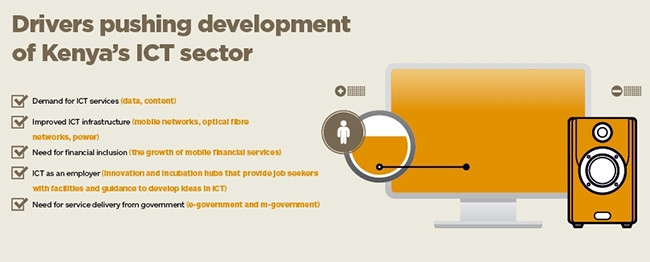
A report compiled by global data research firm IDC in conjunction with the Kenya ICT Board entitled 'Julisha', showed that three years ago, Kenya's ICT space was dominated by application system analysts and system engineers.
Back then it was application system analysts and software developers who were most sought-after. There was a growing demand for IT project management skills and software development.
The report also found that roughly a quarter of companies were not satisfied with the quality of IT professionals from education institutions in Kenya, and about a third of companies had contracted or planned to contract external providers to manage skills shortages.
Independent analyst Hook says while the report was drafted some years ago, the information is still relevant.
Today, the sector is being driven by e-government, m-government, the demand for ICT services (including data and content), improvement in ICT infrastructure (mobile networks, optical fibre networks and power), as well as the use of ICT to create employment, which covers Kenya's growing innovation and business incubation ecosystem.
These areas all require skills and that is a key part of the country's Vision 2030 plan, under the umbrella of the National ICT Master Plan 2013/14 - 2017/18.
Analyst at Ovum, Danson Njue, says the private sector and government are doing a lot to develop skills and cites the recent launch of the Presidential Digital Talent Programme (PDTP) by the Ministry of ICT.
In June this year, Kenya's Treasury Department set aside Kshs17.8 billion towards the country's digital learning programme.
"Building local ICT capacity forms an important part of our Kenya Vision 2030 and the shift from a labour-based to a middle-income, knowledge economy. The ICT Masterplan also recognises that to be a leader in ICT, we need to up the skills of our workforce," said Joseph Tiampati, principal secretary of the Kenyan Ministry of ICT.
The list of tech or tech-related companies that have steered skills-building initiatives Kenya's way include IBM, Microsoft, SAP, Samsung, Intel, Cisco and Multichoice, among others.
These initiatives have determined supply and e-learning as critical components and the emphasis is on leveraging technology from early in the education cycle to build ICT literacy and eventually acquire key skills sets.
In April, the ICT Authority of Kenya signed an MoU with Microsoft with the intention to distribute 1.2 million affordable devices to local primary and secondary schools by 2016.
Safaricom is reported to have an established partnership with business institution Stathmore University to seek and train top technology talent in the Safaricom Academy.
In April 2014, 98 students graduated from Samsung Academy, where they were taught how to deal with hardware.
This article was first published in Brainstorm magazine. Click here to read the complete article at the Brainstorm website.
Share